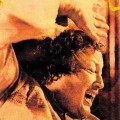-
 Nusrat Fateh Ali Khan
Nusrat Fateh Ali Khanconcert production
Nusrat was one of the first and greatest stars of what was known as World Music, a phrase that has become meaningless in this time of hyper-globalisation but remains useful. He had been celebrated in his native Pakistan for many years when Peter Gabriel “discovered” him for his Real World label. The two Real World collaborations with Michael Brook were especially popular: Mustt, Mustt, and Night Song. Nusrat also performed at Gabriel’s WOMAD concerts along with big western stars, and went on to be heard on several soundtracks for Hollywood movies.
Nusrat was one of the first singers to popularize Qawwali singing beyond South Asia, and was called the “King of Kings of Qawwali,” and performed with a “party” of eleven male back-up musicians, many of whom were relatives. This mystical Sufi devotional music was typically performed at the shrines of Sufi saints in the Muslim areas of Northern India, parts of which are now Pakistan. When Nusrat would sing in front of an audience, large or small, he would enter into a trance so powerful it would hypnotize the listeners as well, and whip them into a frenzy. He felt he was simply a vehicle, a pass-through for messages from “the divine.” He chose to sing the poetry he loved, many from the 11th century saint he called his patron saint, Daata Ganj Bakhsh (Ali Hujwiri).
I had many, many strange and wonderful experiences in Nusrat Fateh Ali Khan’s presence; to earn trust one had to be part of the family, and really hang out … for days or weeks at a time. The getting-to-know part is crucial — the extended family, the culture, the food, the habits, and the music. Only once that happened, was it time to negotiate work. We were introduced by the sister of the cricket player Imran Khan. Nusrat, when he was young, was one of the musicians who entertained for Imran Khan’s family, which like many upperclass Punjabi families was landowning and feudal. By the time I met Nusrat, there was a nascent Islamic fundamentalism in Pakistan, and he was already the equivalent of a rock star. Nusrat’s song Dum Mustt Kalunder, Mustt, Mustt, was a huge hit and had a driving beat that young people adored, and the fundamentalists considered depraved. With safety in doubt (his body guards were armed with rifles) he became increasingly interested in spending time in the USA, and I arranged some of his tours there. (1948 — 1997)
